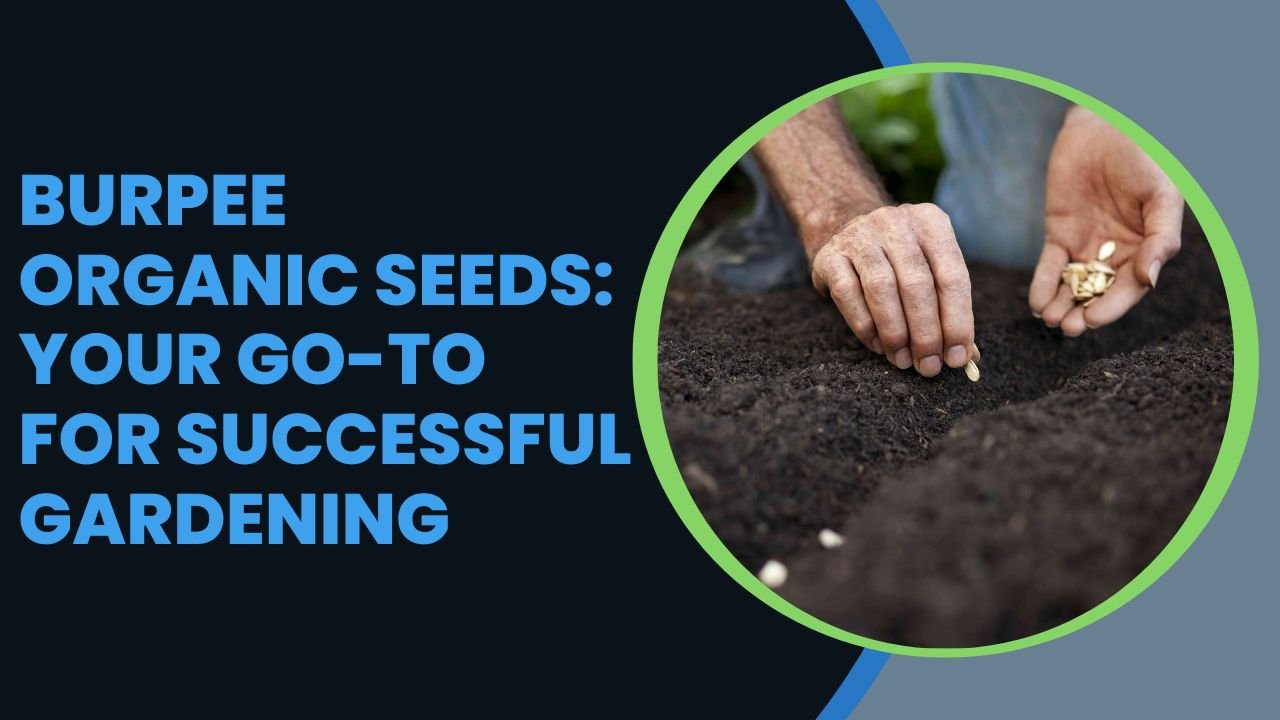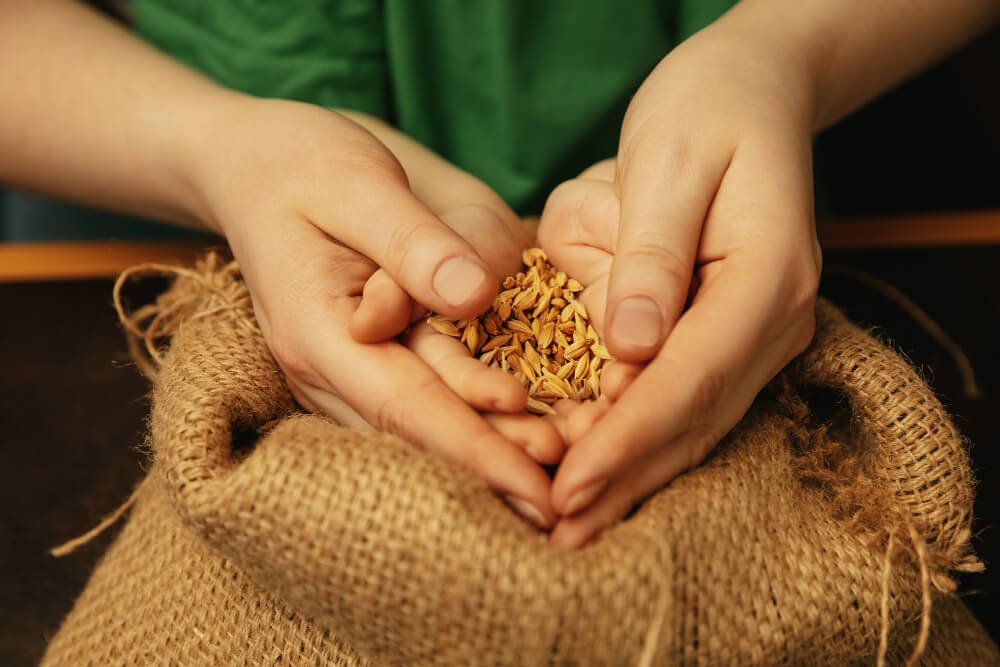Gardening is a rewarding and fulfilling activity that allows us to connect with nature and enjoy the fruits of our labor. Whether you have a large backyard or a small balcony, growing your own plants and vegetables is a delightful experience.
To ensure a successful gardening journey, one of the key factors to consider is the quality of the seeds you use. Organic seeds, in particular, offer numerous benefits for both the environment and your plants.
In this article, we will explore the advantages of using organic seeds and introduce you to Burpee Organic Seeds, a trusted brand that provides a wide range of high-quality seeds for all your gardening needs.

Benefits of using organic seeds
Organic seeds are derived from plants that have been grown without the use of synthetic fertilizers, pesticides, or genetically modified organisms (GMOs). By choosing organic seeds, you contribute to the preservation of biodiversity and the reduction of harmful chemicals in the environment.
Organic gardening promotes healthier soil, water conservation, and the overall well-being of ecosystems. Furthermore, organic seeds have been shown to produce stronger and more resilient plants that are better equipped to resist pests and diseases.
Read Also: Fast-Growing Delights: Discovering Quick-Growing Vegetable Seeds
Overview of Burpee Organic Seeds
When it comes to organic gardening, Burpee Organic Seeds is a trusted name that has been serving gardeners for over a century. With a rich history and a commitment to sustainability, Burpee offers a wide range of organic seeds that cater to all types of gardeners, from beginners to experienced enthusiasts.
Their seeds are carefully selected and tested to ensure high germination rates, superior flavor, and abundant yields. Whether you’re interested in growing vibrant flowers or delicious vegetables, Burpee Organic Seeds has you covered.
Wide range of seed varieties

Burpee Organic Seeds offers an extensive selection of seed varieties to suit every gardener’s preferences and needs. From heirloom tomatoes to aromatic herbs, colorful flowers to exotic fruits, their catalog boasts a diverse range of options. Whether you’re looking for popular varieties or unique and rare plants, Burpee Organic Seeds provides a wide array of choices to help you create a garden that reflects your personal taste and interests.
Read Also: Starting Strong: Which Vegetable Seeds to Start Indoors
High-quality seeds for successful gardening
One of the reasons gardeners trust Burpee Organic Seeds is their commitment to quality. Each seed is carefully hand-picked, cleaned, and tested to ensure it meets rigorous standards.
By focusing on seed quality, Burpee aims to provide gardeners with the best possible chance of success. Their high-quality seeds have excellent germination rates, which means you can expect a higher percentage of seeds to sprout and grow into healthy plants.
The importance of seed quality in gardening
The success of your gardening endeavors heavily relies on the quality of the seeds you choose. High-quality seeds give your plants a head start, increasing the chances of strong and vigorous growth.
When you plant seeds from Burpee Organic Seeds, you can have confidence that you’re giving your garden the best possible start. By investing in quality seeds, you’re setting the foundation for a successful gardening experience.
Read Also: Pre-Planting Prep: Soaking Vegetable Seeds for Optimal Results
Tips for starting seeds indoors

Starting seeds indoors is a great way to get a head start on the growing season. It allows you to control the environment and ensure optimal conditions for germination. When using Burpee Organic Seeds, follow these tips for successful indoor seed starting:
- Select a suitable container or seed tray with drainage holes.
- Use a high-quality seed starting mix that provides good aeration and moisture retention.
- Sow the seeds at the appropriate depth according to the instructions on the seed packet.
- Place the containers in a warm location with sufficient light or use supplemental grow lights.
- Keep the soil consistently moist but not waterlogged.
- Transplant the seedlings into larger pots or the garden once they have developed a strong root system.
Planting seeds outdoors: Best practices
When the weather permits, it’s time to transplant your seedlings outdoors. Follow these best practices for successful planting:
- Choose a location with the right amount of sunlight for the specific plant variety.
- Prepare the soil by removing weeds, loosening it with a garden fork, and adding compost or organic matter.
- Dig a hole or create a furrow that accommodates the plant’s root system.
- Carefully remove the seedlings from their containers, handling them by the leaves to avoid damaging the delicate stems.
- Place the seedlings in the prepared holes or furrows, ensuring they are planted at the same depth as they were in the containers.
- Gently firm the soil around the seedlings and water thoroughly.
Read Also: Shedding Light on Germination: Which Vegetable Seeds Need Light?
Caring for seedlings and young plants

Once your seeds have sprouted and the seedlings are in the ground, it’s important to provide them with the care they need to thrive. Follow these tips for nurturing healthy plants:
- Water regularly, keeping the soil consistently moist but not waterlogged.
- Mulch around the plants to suppress weeds, retain moisture, and regulate soil temperature.
- Monitor for pests and diseases, and take appropriate measures to control them organically.
- Support tall or vining plants with stakes or trellises to prevent them from toppling over.
- Prune and remove any damaged or diseased leaves or branches.
- Regularly fertilize with organic plant food to provide essential nutrients.
Organic gardening techniques
Organic gardening is all about working with nature and avoiding synthetic chemicals. Here are some key organic gardening techniques to incorporate into your gardening practices:
- Compost: Create your own compost using kitchen scraps, yard waste, and other organic materials. It enriches the soil, improves its structure, and provides a steady supply of nutrients to your plants.
- Crop rotation: Rotate your plantings each year to prevent the buildup of pests and diseases in the soil. This technique also helps balance nutrient usage and reduces the need for additional fertilizers.
- Companion planting: Intercrop compatible plants to maximize space, deter pests, and enhance pollination. For example, planting marigolds alongside tomatoes can help repel harmful insects.
- Integrated pest management (IPM): Monitor and control pests using environmentally friendly methods, such as introducing beneficial insects, using physical barriers, or employing organic pest sprays as a last resort.
- Water conservation: Use water-saving techniques like mulching, drip irrigation, and rainwater harvesting to minimize water waste and promote sustainability.
Read Also: Exploring Cross-Pollination: The Journey of Heirloom Seeds
Harvesting and seed saving

One of the joys of gardening is harvesting the fruits of your labor. When using Burpee Organic Seeds, you can expect flavorful and bountiful yields. As you harvest your crops, consider seed saving for future plantings. Saving seeds not only saves money but also helps preserve heirloom and open-pollinated varieties. Follow these steps to save seeds:
- Select healthy and mature seeds from the best plants.
- Clean and dry the seeds thoroughly.
- Store the seeds in a cool, dry, and dark place in labeled containers or envelopes.
Customer reviews and success stories
Burpee Organic Seeds has garnered a loyal customer base due to the quality and reliability of their seeds. Gardeners worldwide have experienced success with Burpee Organic Seeds, and many have shared their positive experiences. Here are a few testimonials:
- “I’ve been using Burpee Organic Seeds for years, and I’m always impressed by the germination rates and the delicious flavor of the vegetables. Highly recommended!” – Sarah G.
- “I’m a beginner gardener, and Burpee Organic Seeds made it easy for me to get started. Their clear instructions and reliable seeds helped me grow a beautiful flower garden.” – David T.
Read Also: Maximizing Growth: Do Vegetable Seeds Grow Through Mulch?
Read Also: Will Heirloom Seeds Reproduce? Unraveling the Mystery of Seed Saving
Read Also: Planting Organic Herb Seeds: Enhancing Flavor and Health in Your Garden
Read Also: Organic Seeds for Hydroponic Gardening: A Green Thumb’s Choice
Conclusion
In conclusion, when it comes to successful gardening, using high-quality organic seeds is paramount. Burpee Organic Seeds provides gardeners with a diverse range of options, ensuring a rewarding and productive gardening experience. Their commitment to quality, sustainability, and customer satisfaction sets them apart as a trusted brand in the gardening community. Start your organic gardening journey with Burpee Organic Seeds and enjoy the joys of growing your own vibrant flowers and delicious vegetables.
Frequently asked questions (FAQs)
Are Burpee Organic Seeds non-GMO?
Burpee Organic Seeds are certified organic and non-GMO. They are produced without the use of genetically modified organisms.
Can I use Burpee Organic Seeds for container gardening?
Yes, Burpee Organic Seeds are suitable for container gardening. They offer a wide selection of varieties that thrive in containers.
Do Burpee Organic Seeds require any special care?
Burpee Organic Seeds require the same care as other seeds. Provide them with proper watering, sunlight, and organic fertilizers for optimal growth.
Can I save seeds from Burpee Organic plants for the next season?
Yes, you can save seeds from Burpee Organic plants for future seasons. Follow proper seed-saving techniques and store them correctly.
